Teaching and Learning Experience Sharing (TALES) Seminar Series (2022/23 Semester 2)
Intended Learning Outcomes
At the end of TALES, participants will be able to:
- Describe the HKBU Graduate Attributes and their importance in the OBTL implementation;
- Develop constructively aligned Intended Learning Outcomes (ILOs), Teaching and Learning Activities (TLAs) and Assessment Methods (AMs) for their respective courses;
- Experiment with new and innovative teaching activities through the deployment of eLearning.
Outline
Workshop Details
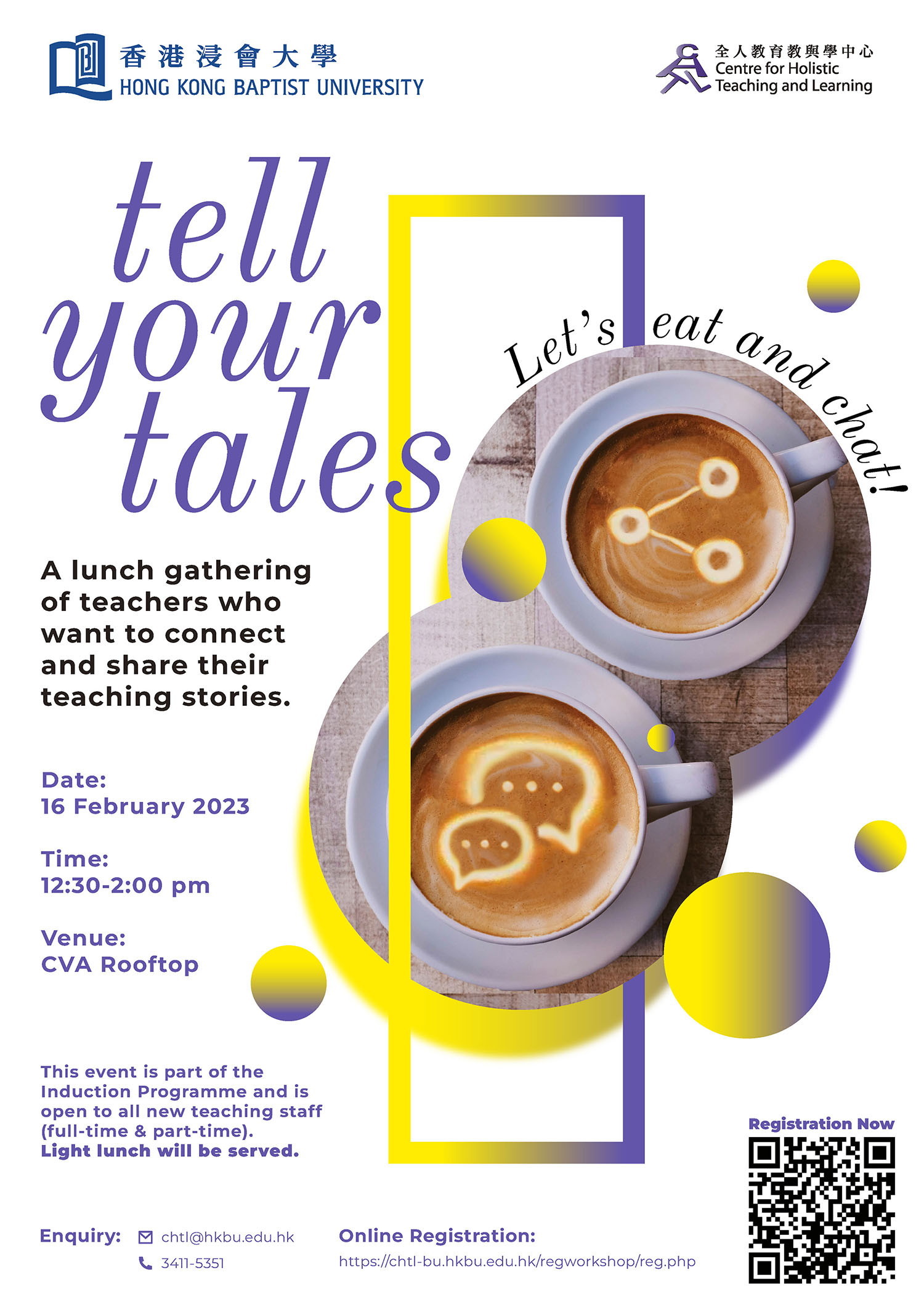

Facilitator(s):
CHTL colleagues
Description:
A lunch gathering of teachers who want to connect and share their teaching stories.
This event is part of the Induction Programme and is open to all new teaching staff (full-time & part-time).
Sustainable Development Goals (SDG) Mapping
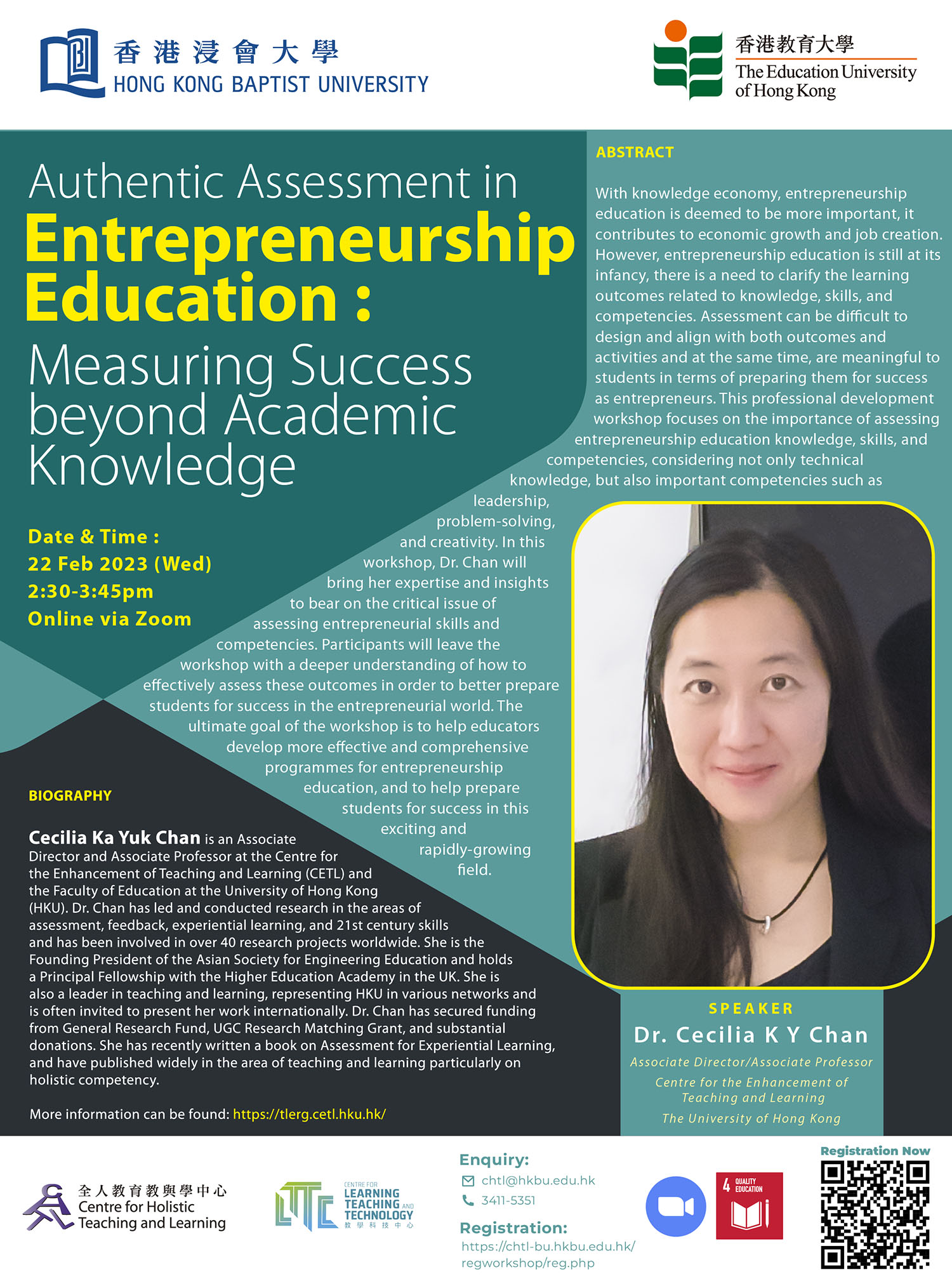

Facilitator(s):
Dr Cecilia CHAN (Associate Director/Associate Professor, Centre for the Enhancement of Teaching and Learning, The University of Hong Kong)
Cecilia Ka Yuk Chan is an Associate Director and Associate Professor at the Centre for the Enhancement of Teaching and Learning (CETL) and the Faculty of Education at the University of Hong Kong (HKU). Dr. Chan has led and conducted research in the areas of assessment, feedback, experiential learning, and 21st century skills and has been involved in over 40 research projects worldwide. She is the Founding President of the Asian Society for Engineering Education and holds a Principal Fellowship with the Higher Education Academy in the UK. She is also a leader in teaching and learning, representing HKU in various networks and is often invited to present her work internationally. Dr. Chan has secured funding from General Research Fund, UGC Research Matching Grant, and substantial donations. She has recently written a book on Assessment for Experiential Learning, and have published widely in the area of teaching and learning particularly on holistic competency. More information can be found: https://tlerg.cetl.hku.hk/
Abstract:
With knowledge economy, entrepreneurship education is deemed to be more important, it contributes to economic growth and job creation. However, entrepreneurship education is still at its infancy, there is a need to clarify the learning outcomes related to knowledge, skills, and competencies. Assessment can be difficult to design and align with both outcomes and activities and at the same time, are meaningful to students in terms of preparing them for success as entrepreneurs. This professional development workshop focuses on the importance of assessing entrepreneurship education knowledge, skills, and competencies, considering not only technical knowledge, but also important competencies such as leadership, problem-solving, and creativity. In this workshop, Dr. Chan will bring her expertise and insights to bear on the critical issue of assessing entrepreneurial skills and competencies. Participants will leave the workshop with a deeper understanding of how to effectively assess these outcomes in order to better prepare students for success in the entrepreneurial world. The ultimate goal of the workshop is to help educators develop more effective and comprehensive programmes for entrepreneurship education, and to help prepare students for success in this exciting and rapidly-growing field.
Sustainable Development Goals (SDG) Mapping
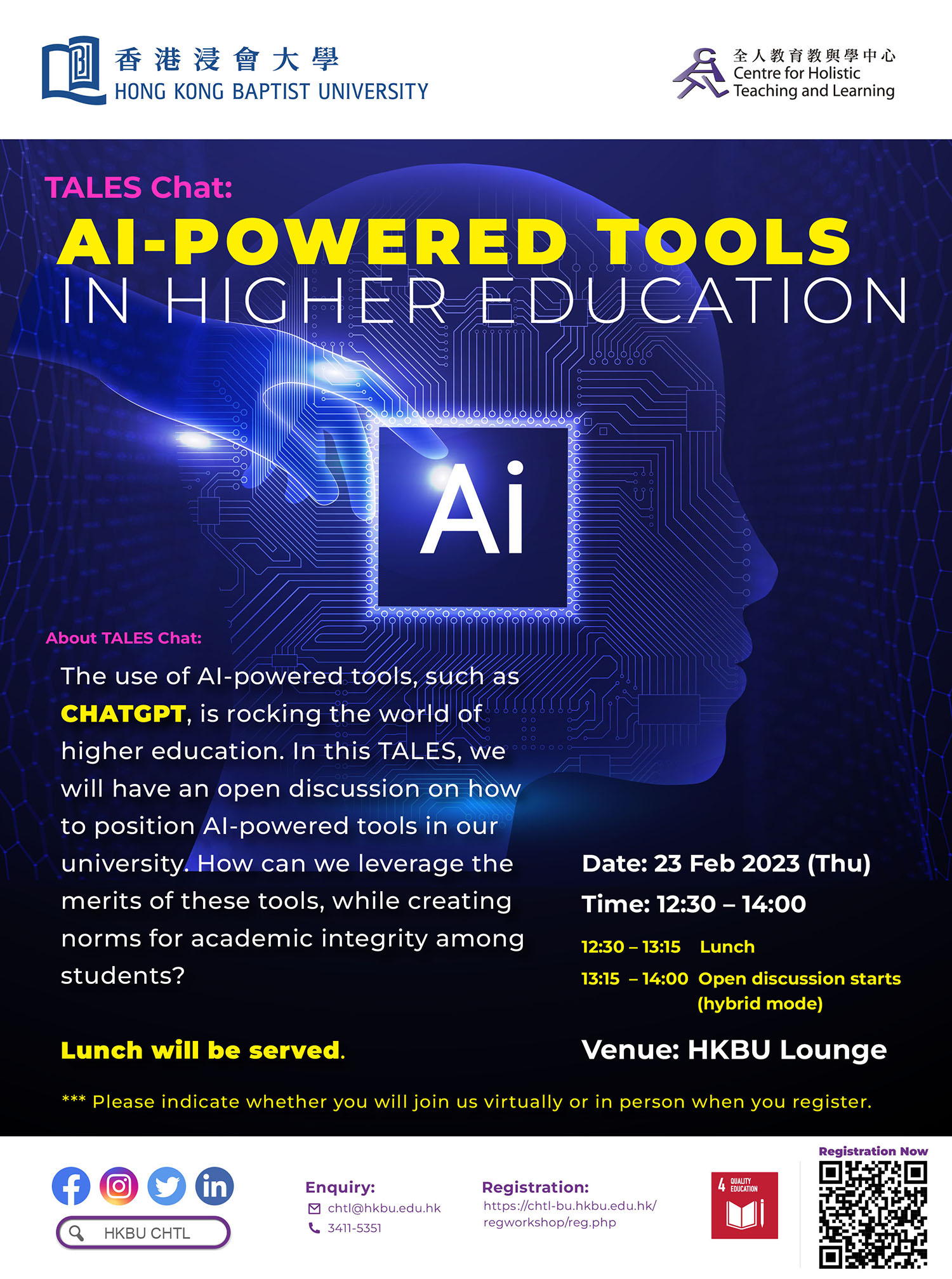

Facilitator(s):
Dr Theresa KWONG (CHTL)
Co-facilitator(s):
Dr Benjamin MOORHOUSE (EDUC)
Dr Janice PAN (TIIS)
Dr Simon WANG (LC)
Brief:
The use of AI-powered tools, such as ChatGPT, is rocking the world of higher education. Lacking insights, many institutions are trying to understand how AI-powered tools fit into the education system.
In this TALES, we will have an open discussion on how to position AI-powered tools in our university. How can we leverage the merits of these tools, while creating norms for academic integrity among students?
This is a great opportunity to exchange ideas and share your experiences about AI-powered tools with your colleagues. Lunch will be served.
Rundown:
12:30 – 1:15 pm Lunch
1:15 – 2:00 pm Open discussion starts (hybrid mode)
Sustainable Development Goals (SDG) Mapping
TALES 4 - Reflection on teaching for your better future through developing a "Teaching Portfolio Chart" (Part 1 & Part 2)
Date & Time:
Part 1: 29 March 2023 (Wednesday), 10:00 am – 12:00 nn (Hong Kong Time)
Part 2: 30 March 2023 (Thursday), 10:00 am – 12:00 nn (Hong Kong Time)
Venue:
Online via ZOOM
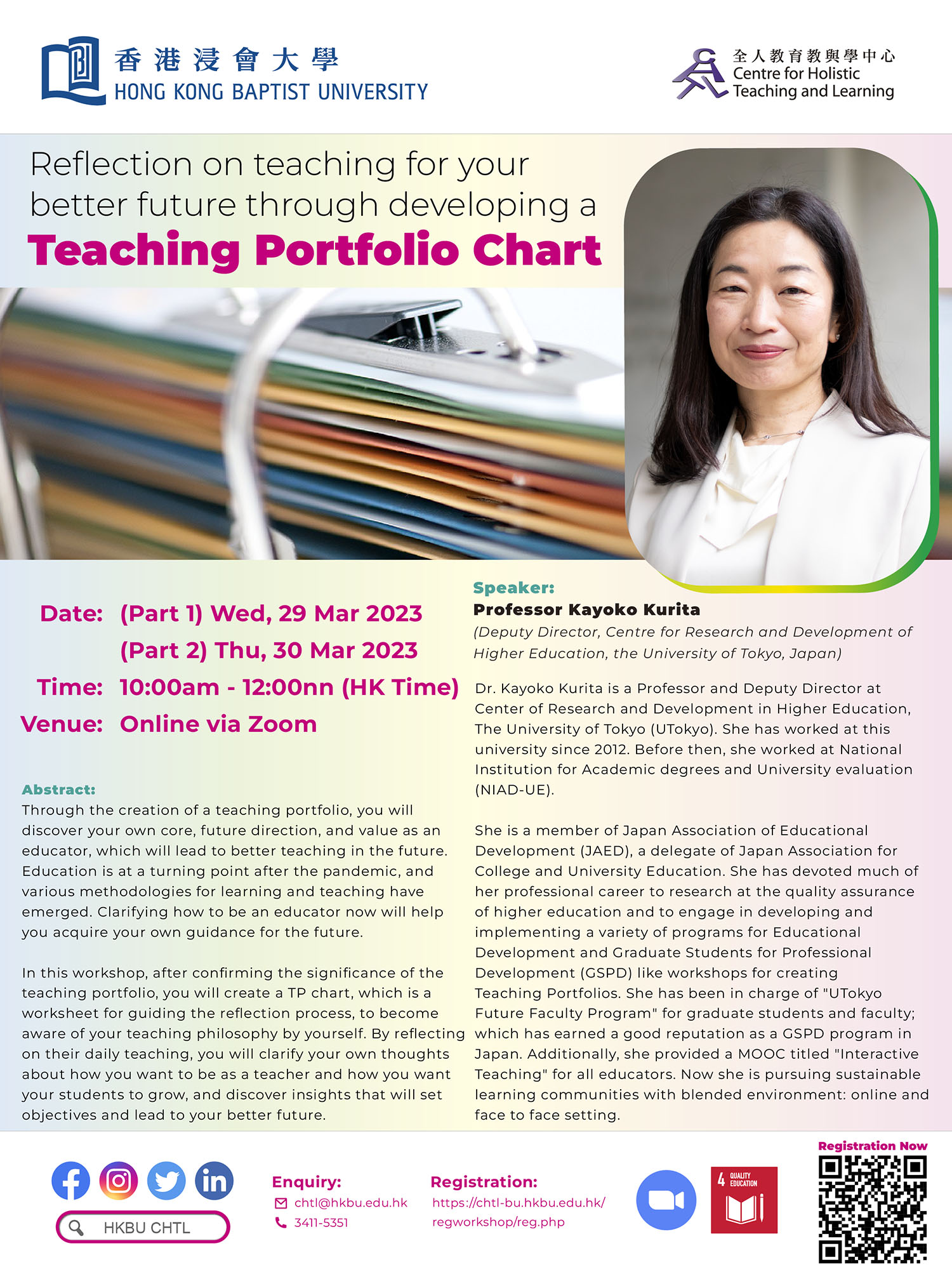

Facilitator(s):
Professor Kayoko KURITA (Deputy Director, Centre for Research and Development of Higher Education, the University of Tokyo, Japan)
Dr. Kayoko Kurita is a Professor and Deputy Director at Center of Research and Development in Higher Education, The University of Tokyo (UTokyo). She has worked at this university since 2012. Before then, she worked at National Institution for Academic degrees and University evaluation (NIAD-UE).
She is a member of Japan Association of Educational Development (JAED), a delegate of Japan Association for College and University Education. She has devoted much of her professional career to research at the quality assurance of higher education and to engage in developing and implementing a variety of programs for Educational Development and Graduate Students for Professional Development (GSPD) like workshops for creating Teaching Portfolios. She has been in charge of "UTokyo Future Faculty Program" for graduate students and faculty; which has earned a good reputation as a GSPD program in Japan. Additionally, she provided a MOOC titled "Interactive Teaching" for all educators. Now she is pursuing sustainable learning communities with blended environment; online and face to face setting.
Abstract:
Through the creation of a teaching portfolio, you will discover your own core, future direction, and value as an educator, which will lead to better teaching in the future. Education is at a turning point after the pandemic, and various methodologies for learning and teaching have emerged. Clarifying how to be an educator now will help you acquire your own guidance for the future.
In this workshop, after confirming the significance of the teaching portfolio, you will create a TP chart, which is a worksheet for guiding the reflection process, to become aware of your teaching philosophy by yourself. By reflecting on their daily teaching, you will clarify your own thoughts about how you want to be as a teacher and how you want your students to grow, and discover insights that will set objectives and lead to your better future.
Sustainable Development Goals (SDG) Mapping
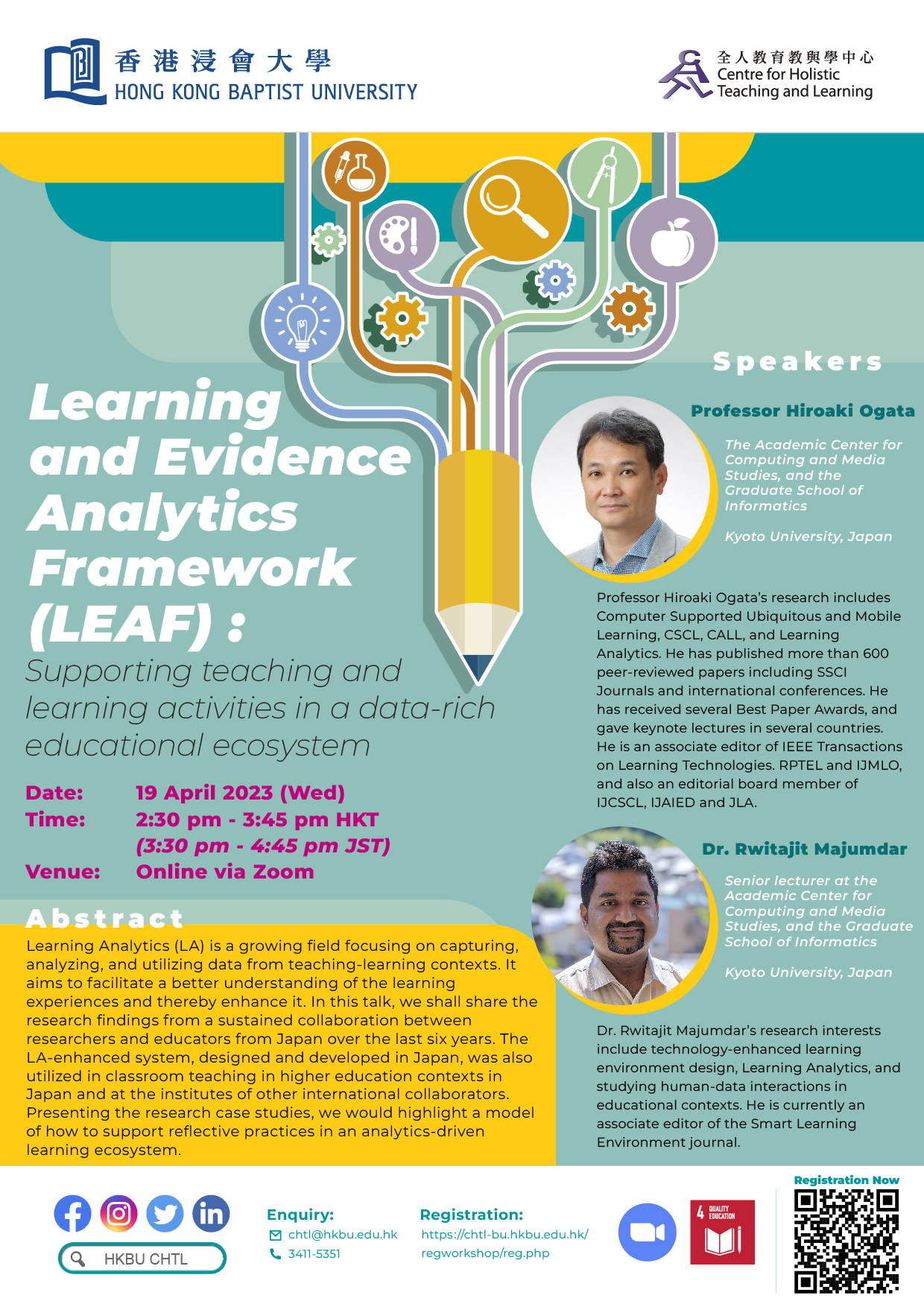

Facilitator(s):
Professor Hiroaki OGATA (Professor, the Academic Center for Computing and Media Studies, and the Graduate School of Informatics, Kyoto University, Japan)
Professor Hiroaki OGATA’s research includes Computer Supported Ubiquitous and Mobile Learning, CSCL, CALL, and Learning Analytics. He has published more than 600 peer-reviewed papers including SSCI Journals and international conferences. He has received several Best Paper Awards, and gave keynote lectures in several countries.
He is an associate editor of IEEE Transactions on Learning Technologies. RPTEL and IJMLO, and also an editorial board member of IJCSCL, IJAIED and JLA.
Dr. Rwitajit MAJUMDAR (Senior lecturer, the Academic Center for Computing and Media Studies, and the Graduate School of Informatics, Kyoto University, Japan)
Dr. Rwitajit MAJUMDAR’s research interests include technology-enhanced learning environment design, Learning Analytics, and studying human-data interactions in educational contexts. He is currently an associate editor of the Smart Learning Environment journal.
Abstract:
Learning Analytics (LA) is a growing field focusing on capturing, analyzing, and utilizing data from teaching-learning contexts. It aims to facilitate a better understanding of the learning experiences and thereby enhance it. In this talk, we shall share the research findings from a sustained collaboration between researchers and educators from Japan over the last six years. The LA-enhanced system, designed and developed in Japan, was also utilized in classroom teaching in higher education contexts in Japan and at the institutes of other international collaborators.
Presenting the research case studies, we would highlight a model of how to support reflective practices in an analytics-driven learning ecosystem.
Sustainable Development Goals (SDG) Mapping
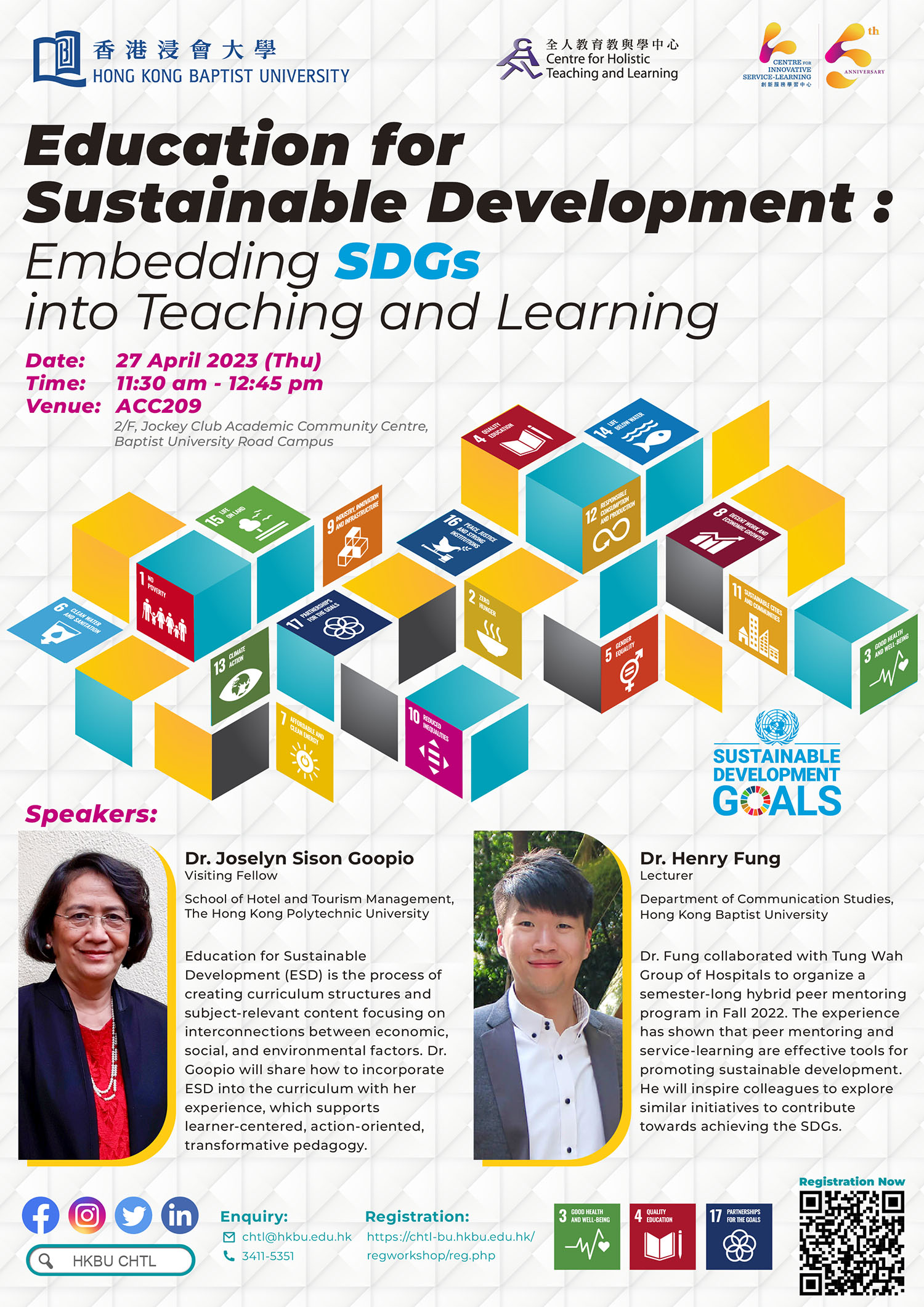

Facilitator(s):
Dr. Joselyn Sison GOOPIO (Visiting Fellow, School of Hotel and Tourism Management, The Hong Kong Polytechnic University)
Education for Sustainable Development (ESD) is the process of creating curriculum structures and subject-relevant content focusing on interconnections between economic, social, and environmental factors. Dr. GOOPIO will share how to incorporate ESD into the curriculum with her experience, which supports learner-centered, action-oriented, transformative pedagogy.
Dr. Henry FUNG (Lecturer, Department of Communication Studies, Hong Kong Baptist University)
Dr. FUNG collaborated with Tung Wah Group of Hospitals to organize a semester-long hybrid peer mentoring program in Fall 2022. The experience has shown that peer mentoring and service-learning are effective tools for promoting sustainable development. He will inspire colleagues to explore similar initiatives to contribute towards achieving the SDGs.
Sustainable Development Goals (SDG) Mapping
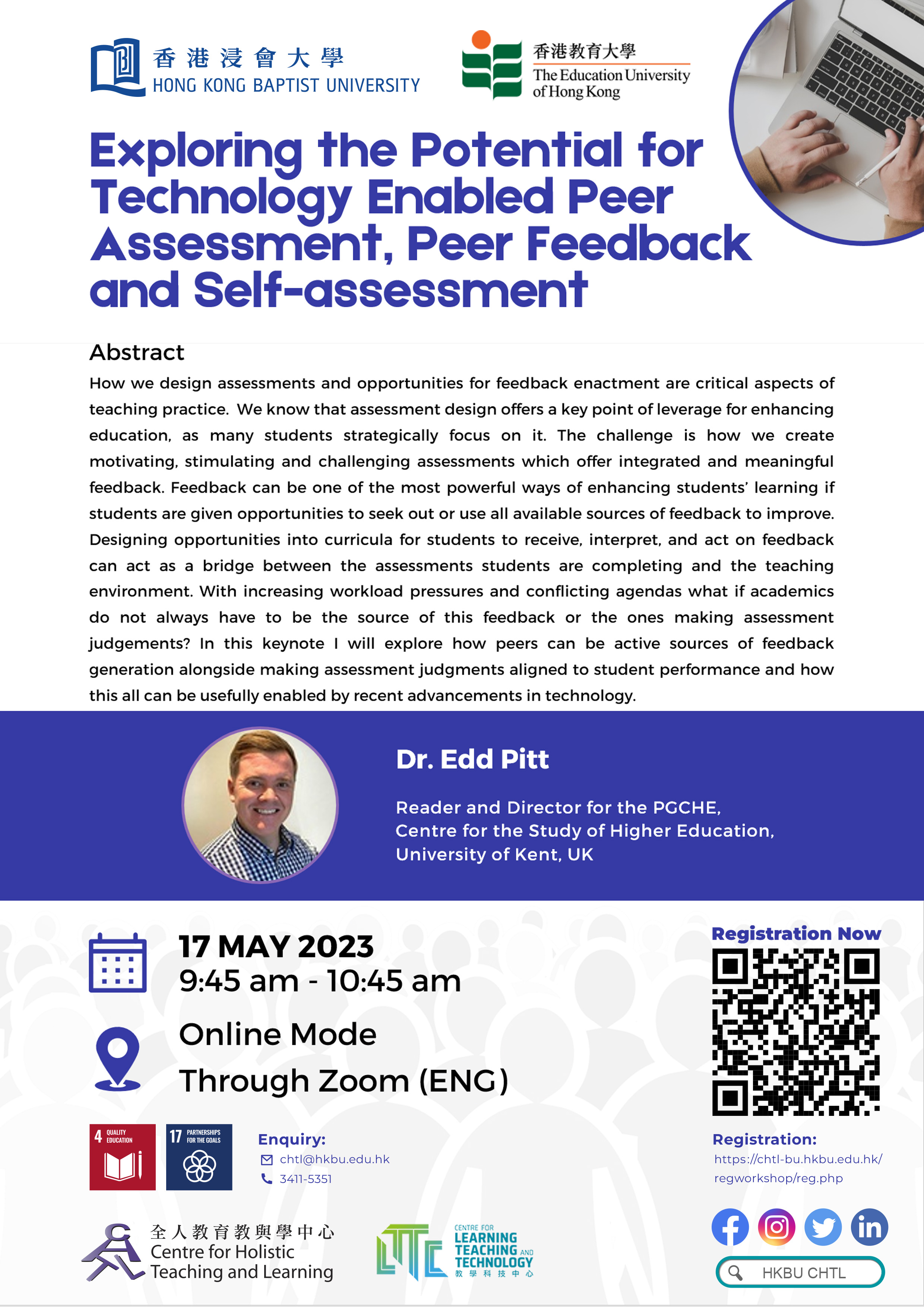

Facilitator(s):
Dr. Edd Pitt (Reader and Director for the PGCHE, Centre for the Study of Higher Education, University of Kent, UK)
Abstract:
How we design assessments and opportunities for feedback enactment are critical aspects of teaching practice. We know that assessment design offers a key point of leverage for enhancing education, as many students strategically focus on it. The challenge is how we create motivating, stimulating and challenging assessments which offer integrated and meaningful feedback. Feedback can be one of the most powerful ways of enhancing students’ learning if students are given opportunities to seek out or use all available sources of feedback to improve. Designing opportunities into curricula for students to receive, interpret, and act on feedback can act as a bridge between the assessments students are completing and the teaching environment. With increasing workload pressures and conflicting agendas what if academics do not always have to be the source of this feedback or the ones making assessment judgements? In this keynote I will explore how peers can be active sources of feedback generation alongside making assessment judgments aligned to student performance and how this all can be usefully enabled by recent advancements in technology.
Sustainable Development Goals (SDG) Mapping
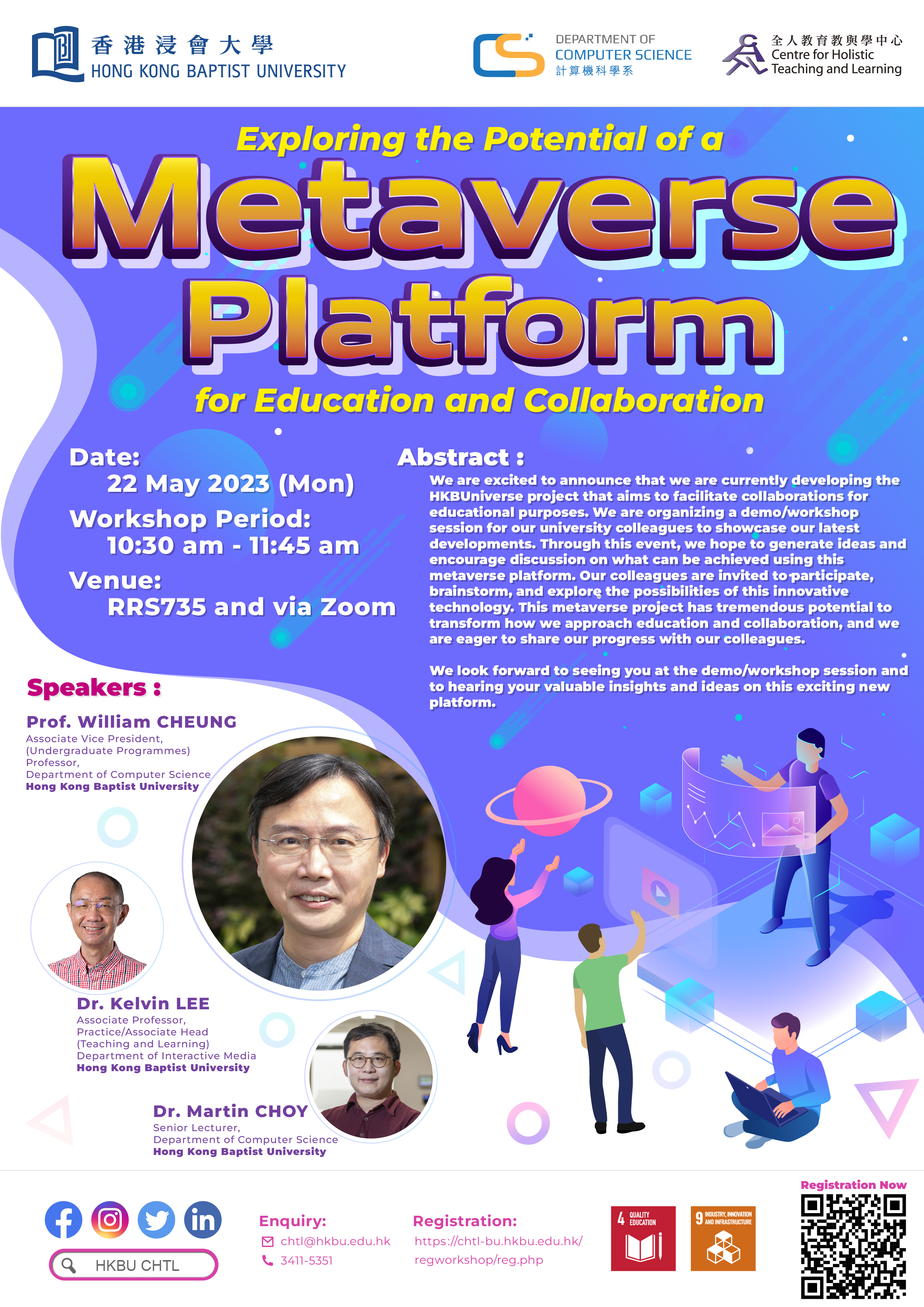

Facilitator(s):
Prof William CHEUNG (AVP (Undergraduate Programmes))
Dr Kelvin LEE (IMD)
Dr Martin CHOY (COMP)
Abstract:
We are excited to announce that we are currently developing the HKBUniverse project that aims to facilitate collaborations for educational purposes. We are organizing a demo/workshop session for our university colleagues to showcase our latest developments. Through this event, we hope to generate ideas and encourage discussion on what can be achieved using this metaverse platform. Our colleagues are invited to participate, brainstorm, and explore the possibilities of this innovative technology. This metaverse project has tremendous potential to transform how we approach education and collaboration, and we are eager to share our progress with our colleagues.
We look forward to seeing you at the demo/workshop session and to hearing your valuable insights and ideas on this exciting new platform.
Sustainable Development Goals (SDG) Mapping
Facilitator(s):
Dr Benjamin CHENG, SFHEA (SCE)
Dr Archimedes GUERRA, FHEA (AEF)
Dr Theresa KWONG, SFHEA (CHTL)
Dr Vicky LEE, SFHEA & FHEA (External Member, HEA Fellowship Core Group)
Abstract:
Advance HE has awarded Fellowships to over 169,000 faculty members worldwide (as of April 2023) in recognition of their innovative teaching practices and expertise in higher education. To assist interested Faculty members to secure this international teaching recognition, HKBU is one of two local universities with an accredited professional development scheme that helps colleagues prepare their applications for different categories of Fellowship, including Associate Fellowship, Fellowship, and Senior Fellowship (https://chtl.hkbu.edu.hk/teachers/international-recognition.html).
To join the Scheme, you have to attend this introductory workshop, which will cover the following topics:
- Introduction to the HKBU HEA Fellowship Scheme
- Available support for applicants
- Ways to prepare and submit a successful application
- Required evidence for your application
- Successful application experiences
- Q&A session
By the end of this workshop, you will be able to:
- Describe the purpose of Advance HE Fellowship and the requirements HKBU HEA Fellowship scheme;
- Describe the three main domains of the UK Professional Standard Framework UKPSF; and
- Choose the most appropriate HEA fellowship category for your application.
Sustainable Development Goals (SDG) Mapping
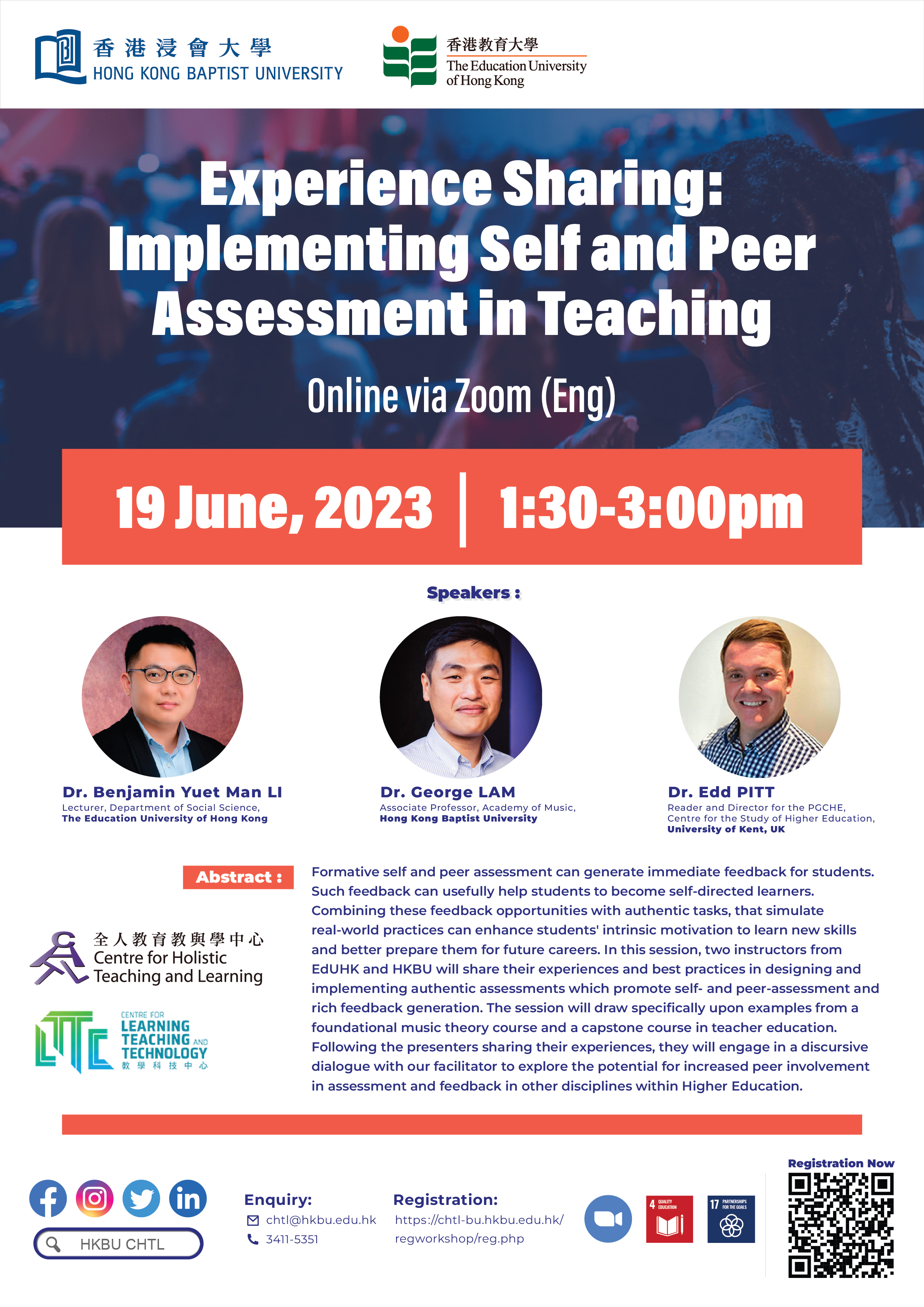

Facilitator(s):
Dr Benjamin Yuet Man LI (Lecturer, Department of Social Science, The Education University of Hong Kong)
Dr George LAM (Associate Professor, Academy of Music, Hong Kong Baptist University)
Dr Edd PITT (Reader and Director for the PGCHE, Centre for the Study of Higher Education, University of Kent, UK)
Abstract:
Formative self and peer assessment can generate immediate feedback for students. Such feedback can usefully help students to become self-directed learners.
Combining these feedback opportunities with authentic tasks, that simulate real-world practices can enhance students' intrinsic motivation to learn new skills and better prepare them for future careers. In this session, two instructors from EdUHK and HKBU will share their experiences and best practices in designing and implementing authentic assessments which promote self- and peer-assessment and rich feedback generation. The session will draw specifically upon examples from a foundational music theory course and a capstone course in teacher education.
Following the presenters sharing their experiences, they will engage in a discursive dialogue with our facilitator to explore the potential for increased peer involvement in assessment and feedback in other disciplines within Higher Education.
Sustainable Development Goals (SDG) Mapping
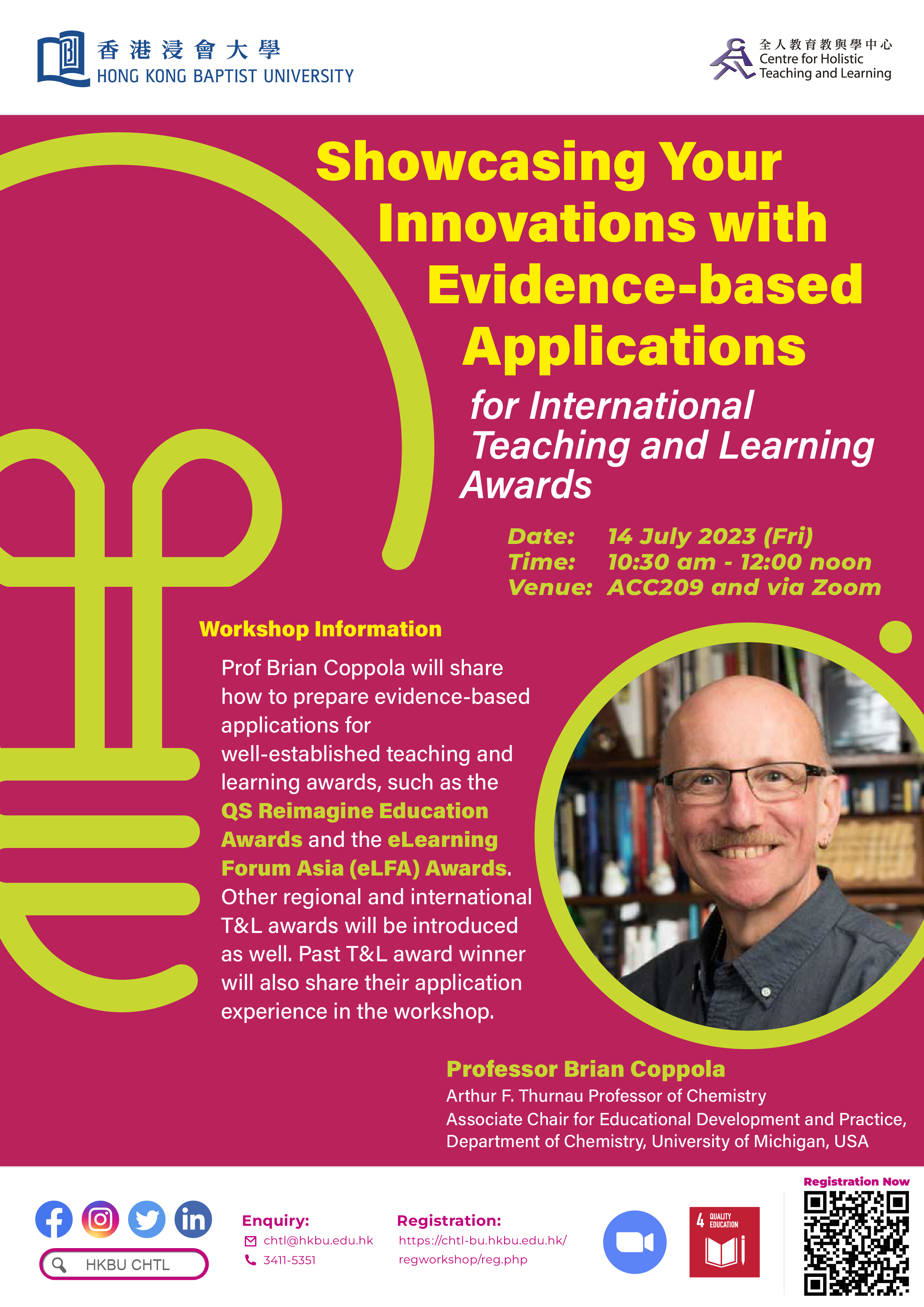

Facilitator(s):
Professor Brian COPPOLA (Arthur F. Thurnau Professor of Chemistry, Associate Chair for Educational Development and Practice, Department of Chemistry, University of Michigan, USA)
Abstract:
In recent years, the landscape of higher education teaching and learning has undergone significant changes with the advent of technology and new pedagogical approaches. To recognize and promote innovative teaching and learning practices, there are various teaching and learning recognitions around the world. These prestigious awards include the Reimagine Education Awards and e-Learning Forum Asia Awards, to name just a few.
In this workshop, Professor Brian Coppola, a passionate educator from the University of Michigan, who has been recognised for his innovative and effective teaching practices and has received multiple teaching awards, will share his experience on promoting best teaching practices and preparing evidence-based applications for regional/international teaching and learning awards. Following Professor Coppola, some tips on preparing award-winning applications will be shared.
An overview of the various awards opportunities will also be covered, along with the judging criteria for each of the awards.
By the end of the workshop, you should be able to:
- identify the awards opportunities available for HKBU colleagues
- prepare an evidence-based teaching and learning award entries